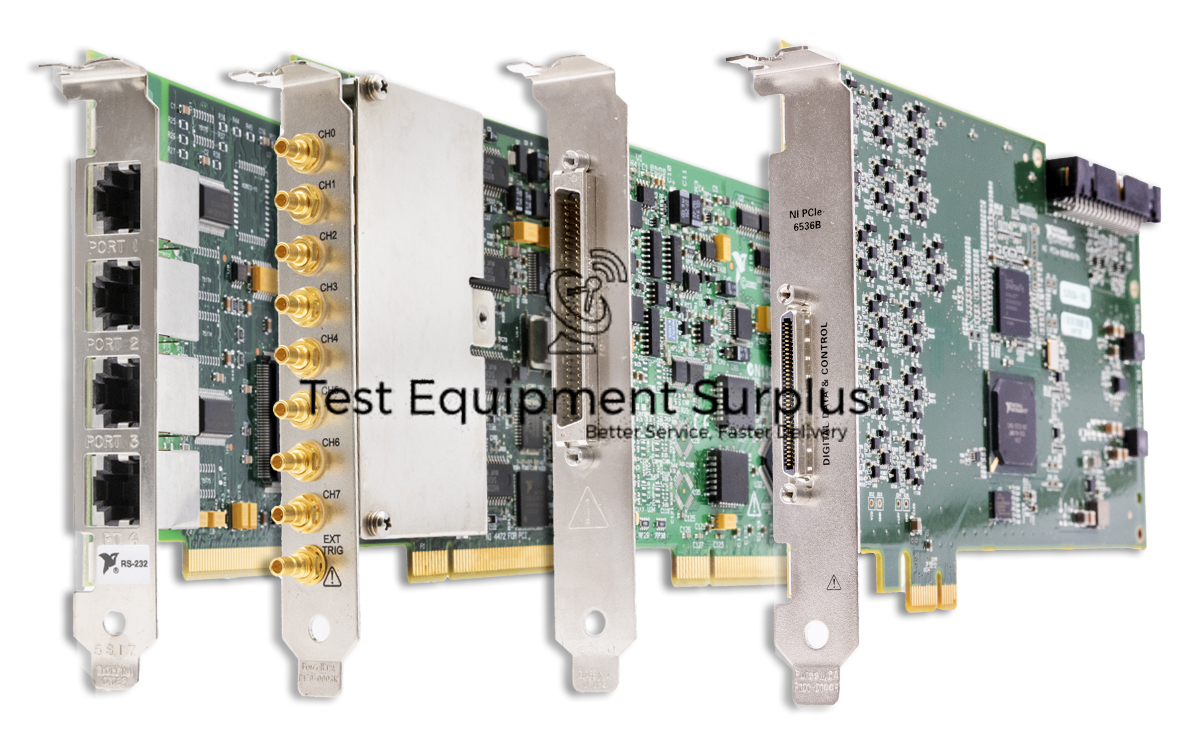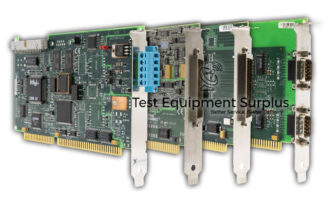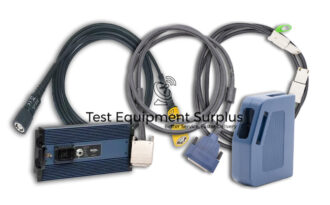Description
The National Instruments PCI-6229 is a versatile multifunction DAQ device with part numbers 779068-01 and 191329B-01, featuring 32 single-ended or 16 differential analog inputs and 4 analog outputs, complemented by 48 digital I/O channels. It delivers high-resolution data acquisition with a 16-bit resolution and supports a variety of input ranges including ±0.2 V, ±1 V, ±5 V, and ±10 V, ensuring flexibility across various signal types.
The device is engineered to handle a maximum voltage of ±11 V of AI GND on its analog inputs and is designed with impressive channel isolation, boasting a crosstalk of -75 dB between adjacent channels and -90 dB between non-adjacent channels. With a substantial 4,095 samples input FIFO and a 4,095 entries scan list memory, the PCI-6229 ensures efficient data handling and storage capacity.
Capable of utilizing DMA, programmed I/O, and interrupts for data transfer modes, the device offers flexibility in system integration and data management. Furthermore, it provides overvoltage protection of up to ±25 V for all sense and analog input channels, safeguarding the device against unexpected voltage spikes. The analog outputs of the PCI-6229 are capable of achieving a maximum update rate that ranges from 833 kS/s with one channel to 625 kS/s when all four channels are in use.
| Feature | Specification |
|---|---|
| Part Number | 779068-01, 191329B-01 |
| Analog Inputs (AI) | 32 single-ended or 16 differential |
| Analog Outputs (AO) | 4 AO |
| Digital I/O (DIO) | 48 DIO |
| Resolution | 16-bit |
| Input Ranges | ±0.2 V, ±1 V, ±5 V, ±10 V |
| Maximum Voltage (AI) | ±11 V of AI GND |
| Crosstalk (Adjacent Channels) | -75 dB |
| Crosstalk (Non-Adjacent Channels) | -90 dB |
| Input FIFO | 4,095 samples |
| Scan List Memory | 4,095 entries |
| Data Transfer Modes | DMA, programmed I/O, interrupts |
| Overvoltage Protection | ±25 V for all sense and AI channels |
| Maximum Update Rate (AO) | 833 kS/s (1 channel), 740 kS/s (2 channels), 666 kS/s (3 channels), 625 kS/s (4 channels) |
Question 1: Given its capability to handle a variety of signal types, what input ranges does the National Instruments PCI-6229 support for data acquisition?
Answer 1: The National Instruments PCI-6229 supports input ranges of ±0.2 V, ±1 V, ±5 V, and ±10 V for data acquisition, accommodating a variety of signal types.
Question 2: What are the key features and specifications of the National Instruments PCI-6229 multifunction DAQ device, including its input/output capabilities, resolution, input ranges, channel isolation, data transfer modes, and overvoltage protection?
Answer 2: The National Instruments PCI-6229 DAQ device offers input range options of ±0.2 V, ±1 V, ±5 V, and ±10 V, and features overvoltage protection of up to ±25 V for all sense and analog input channels.
Question 3: What type of input ranges does the National Instruments PCI-6229 support, and how does this versatility affect its compatibility with various signal types?
Answer 3: The National Instruments PCI-6229 supports input ranges of ±0.2 V, ±1 V, ±5 V, and ±10 V, which allows for versatile compatibility with a wide range of signal types, ensuring that it can accommodate different voltage requirements for various applications.
Question 4: What are the key features and protections offered by the National Instruments PCI-6229 DAQ device to ensure flexibility and safety in diverse data acquisition tasks?
Answer 4: The National Instruments PCI-6229 multifunction DAQ device offers 32 single-ended or 16 differential analog inputs, 4 analog outputs, and 48 digital I/O channels, with a 16-bit resolution and input ranges of ±0.2 V, ±1 V, ±5 V, and ±10 V. It can handle a maximum voltage of ±11 V of AI GND on its analog inputs and features channel isolation with crosstalk of -75 dB between adjacent channels and
Question 5: What are the input range options and overvoltage protection specifications for the National Instruments PCI-6229 DAQ device?
Answer 5: The National Instruments PCI-6229 DAQ device offers key features such as 32 single-ended or 16 differential analog inputs, 4 analog outputs, and 48 digital I/O channels, along with high-resolution 16-bit data acquisition across various input ranges including ±0.2 V, ±1 V, ±5 V, and ±10 V. For safety and flexibility, it features robust channel isolation with -75 dB crosstalk between adjacent channels and -90 dB between non-adj



